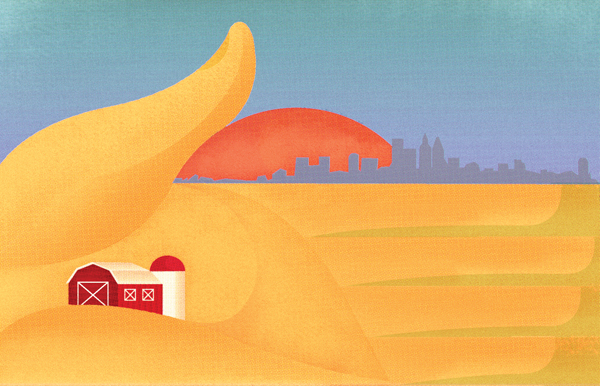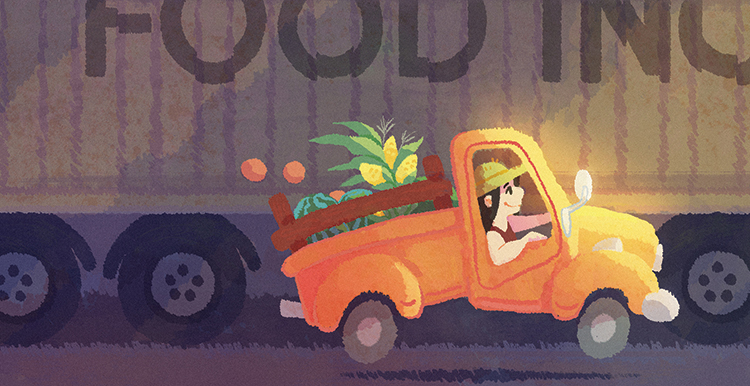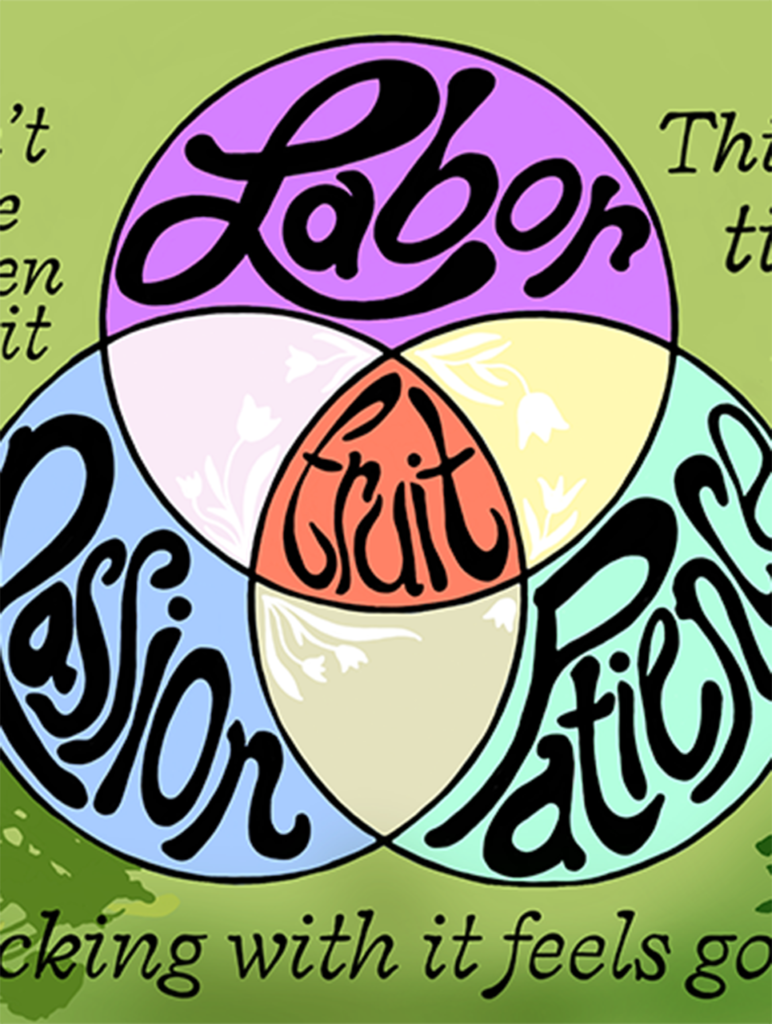Illustration by Max Amato
Which Farm to Table?
by Jerry Silberman
Question: Is organic food better for my health?
The Right Question: Is local food better for my planet (which includes me)?
When we’re stocking up on groceries, most of us do mental math around price, convenience, cravings, health, and even environmental or economic impacts. Pondering an organic label, we ask ourselves, “Is it really better for me? Or the planet?”
One of the ways we can dig in is by examining what “organic” means.
When you see the term organic, as defined by the U.S. Department of Agriculture (USDA), it means food grown without artificial chemical poisons or fertilizers, the use of which has far-reaching, negative effects on human health and the integrity of the environment.
According to the New England-based nonprofit Toxics Action Center, the effects of pesticides are wide-ranging and can include, “short-term impacts such as headaches and nausea to chronic impacts like cancer, reproductive harm and endocrine disruption.” Don’t forget that while there may be few pesticides left on your produce by the time it gets to you, farm workers get heavy exposure. The advocacy group Farm Worker Justice maintains that many safeguards put in place are not being enforced within the U.S. food production system.
The biggest conventional food companies are now deep into the growth industry of organics, even as they lobby to weaken the legal definition of organic. But for now, consumers should know that organic food consistently contains fewer poisons, and likely has a better nutritional content, than the same food produced by conventional means.
While there is a legal definition of “organic,” there is no legal definition of “local.” In the way it’s often used, it can be more about supply chain than distance. Can you identify the producer and visit the farm? Does the food reach you through trusted hands, not large corporate intermediaries? If we assume that you choose foods produced within 150 miles of where you live when possible, why might this be more, or less, sustainable than organically grown food?
For the purpose of this column, “sustainable” means that a society—and the systems within it—must operate within the current budget of energy available without depleting non-renewable resources.
That means energy consumption is also central to our question. If it takes more energy to produce our food than we get out of it, we are drawing down our societal energy bank account without ever making a deposit: not a good strategy for financial stability or food security.
At present, according to USDA data, producing one calorie of food energy with conventional mechanized American farming methods takes about 10 calories of input. Most of that subsidy comes in the form of fossil fuels, whether directly as tractor fuel, or indirectly as agricultural chemicals.
With these definitions and the idea of a societal “energy budget” in mind, there are three reasons why locally produced food is often more sustainable than organic food.
First, local food—in our region, Eastern Pennsylvania—tends to be produced with a lower energy input from seed to table, as a result of smaller farms and more efficient practices, as well as the reduced distance of transport from farm to table.
Second, local farmers often have direct contact with the people who are purchasing what they grow (or are connected to them by short, non-exploitive supply chains like those created through Community Supported Agriculture). These farmers are more likely to use—and to be receptive to—expanding sustainable practices that produce much better quality food than corporate farms, especially if they know they will have the loyalty of their customers.
While corporate organic farms eschew the use of fertilizers and pesticides, they have the same mandate as conventional farms to produce picture-perfect produce, which leads to the third point in favor of local. Organic farming often uses more energy per unit of production than conventional farming because additional energy-intensive technology and labor are needed to make up for the poisonous shortcuts taken by conventional agriculture to get unblemished fruits and vegetables to market.
If you seek sustainable food, be proactive, and know that you must balance several factors that may come down to your personal priorities: your health, the health of farmworkers, and health of the environment. Just remember that the prettiest apple may be produced in a way that gives the planet indigestion—even if it’s organic.
Jerry Silberman is a cranky environmentalist and union negotiator who likes to ask the right question and is no stranger to compromise.










There is another choice – the "free" food beneath our feet – wild edible plants! For the past 5 years the Wild Foodies of Philly have been producing free field guides and conducting tours, all aimed at educating the public about wild edible plants, fruits, trees, etc.. You can’t get greener than that. Join us!
Lynn Landes, founder
http://www.WildFoodies.org